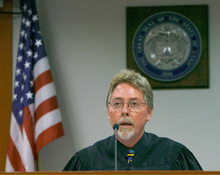This is an archived article that was published on sltrib.com in 2010, and information in the article may be outdated. It is provided only for personal research purposes and may not be reprinted.
Most Utahns who end up in the legal system will have their cases heard by a county or municipal judge in a justice court.
On Nov. 2, the tables will turn: Voters will have the opportunity to give a thumbs up or down to the justice court judges who sit in their county.
A judge who receives a majority of votes in the retention election will remain on the bench. Those who do not will step down in January.
Judge Jerald Jensen, chairman of the Justice Court Board, thinks a retention vote is a "good middle ground."
In the past, depending on the jurisdiction, judges were elected to the bench or hired by a mayor or a council, which then had sole discretion on whether to renew their contracts. Now, county and municipal court judges are appointed and then stand for retention every four years, giving residents a say in the process.
Retention elections for county justice court judges have been held for almost two decades. This year is the first time that city judges also are on the ballot.
Justice courts deal with Class B and C misdemeanors, small claims and infractions, such as traffic violations. Previously, small claims cases, which cover disputes involving up to $10,000, could be handled in either a justice court or a district court. Beginning Sept. 1, all small claims were moved to justice courts.
Some judges serve on both county and municipal benches. Some of them hear cases daily and others have limited court hours each week. They are not required by law to be lawyers — more than half are not — but must attend 30 hours of judicial education each year to remain certified.
Justice court judges can make no more than 90 percent of what a state district court judge makes unless they sit on two or more benches. In those cases, their combined pay can be no more than the $132,150 annual salary of a district court judge. Pay varies depending on location.
Jensen, who serves on the Davis County and Sunset Municipal justice court benches, said the only contact most people will have with the court system will be through the justice courts.
"Their view of the justice system is the justice courts," he said.
In justice courts, four-member juries hear trials and city attorneys and county attorneys prosecute cases. Defendants often forgo an attorney and represent themselves.
Anyone who is not happy with a decision is entitled to a new trial in the state's district court.
In fiscal 2009, there were 236,448 cases filed in the district courts, which has the authority to try all civil, criminal felony and domestic relations cases and, in certain circumstances, misdemeanors. Cases in district courts tend to be more complex and often involve pretrial hearings and lengthy trials.
In that same period, 595,221 cases were filed in Utah's justice courts: 495,513 traffic, 79,558 misdemeanor and 20,150 small claims. These matters usually take much less time to resolve.
During a court session last Friday, Judge John Baxter of Salt Lake City Justice Court dealt with a long string of cases, ranging from public urination to traffic violations to disorderly conduct. Many took just a few minutes, with the defendant pleading guilty to a minor infraction and being fined.
Some took a little longer as Baxter explained to defendants their rights and made sure they understood the possible penalties for their alleged offenses.
Of the total justice court cases, 242,927 were filed in Salt Lake County. There were 193,775 traffic cases, 36,942 misdemeanors and 12,210 small claims.
Utah Justice Courts
Justice Courts are established by counties and municipalities to deal with Class B and C misdemeanors, small claims and infractions — minor offenses such as city traffic violations. There are 108 Justice Court judges serving in 134 county and municipal courts.
Justice Court judges are initially appointed by a county commission or city officials, then stand for retention every four years. The Utah Judicial Council certifies whether a judge is qualified for retention election based on performance evaluations.
The results are published in a voter information pamphlet, which can be found at http://www.utcourts.gov/knowcts/docs/Voter_Information_Pamphlet.pdf.
Source: Utah State Courts —
Judges on ballot
Justice court judges in Salt Lake County who are up for retention:
Clinton Balmforth, Alta and South Jordan
Holly M. Barringham, Salt Lake County and Salt Lake City
John L. Baxter, Salt Lake City
Daniel F. Bertch, Draper
Gregory L. Bown, Riverton
L.G. Cutler, Salt Lake City
Daniel B. Gibbons, Holladay
Shauna Graves-Robertson, Salt Lake County
Catherine M. Johnson, South Salt Lake
Ronald E. Kunz, West Jordan
Michael W. Kwan, Taylorsville
Sydney Magid, Salt Lake City
Brendan P. McCullagh, West Valley City
Reed S. Parkin, Bluffdale and Herriman
Jeanne M. Robison, Salt Lake City
Keith L. Stoney, West Valley City
Marsha C. Thomas, Taylorsville
W. Paul Thompson, Murray
Virginia Ward, Salt Lake City
Susan Weidauer, Sandy
Ronald C. Wolthuis, Midvale.
Voters who live in Salt Lake County can cast ballots on all of these judges. The judges will appear once on the ballot for every court in which they preside.
Also up for retention are judges from the Utah Court of Appeals, district court and juvenile court.



